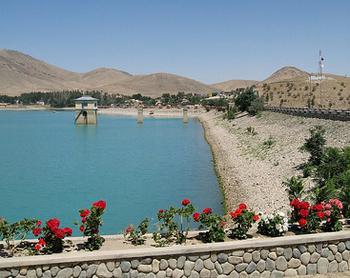Water Management Key to Lifting Afghanistan Out of Poverty
KABUL, Afghanistan, July 8, 2009 (ENS) - The inefficient management of Afghanistan's water resources is linked to both the country's widespread poverty and deadly tribal conflicts over territory, a United Nations envoy said Tuesday, calling for better management to help foster stability and build prosperity.
Kai Eide, the UN secretary-general's special representative, told a conference on water resources development in Kabul that donors and nongovernmental organizations should focus more on enhancing the management of water resources.
 |
Kai Eide is the UN secretary-general's special representative for Afghanistan. (Photo by Fardin Waezi courtesy UNAMA) |
"Whether we look at poverty, food security, health or economic development, there is no issue more important for this country at this time than the development of Afghanistan's water resources," he said.
Afghanistan's economy remains dominated by agriculture, which employs two-thirds of the national workforce and accounts for more than half of gross domestic product. But decades of conflict and misrule have destroyed irrigation systems, stunting economic growth.
Eide said that trans-boundary issues with other Central Asian countries should also be resolved.
"Afghanistan needs agreements with its neighbors that can provide equitable sharing and cooperative management of water resources in accordance with principles of international law," he said.
"Afghanistan has a right to its share of its resources. Today they are unused. The United Nations is committed to helping to effectively manage the world's trans-boundary waters and will continue to support such efforts," Eide said.
The special representative added that the predicted good harvest this year, following strong rainfall, should not detract from the need for sound water management policies.
 |
Lake Qargha dam near Kabul (Photo by D-minor) |
The UN's Food and Agriculture Organization is helping local communities repair canals and irrigation systems. "This is an important part of community development because the management of these systems is based on traditions that include the division of water, shared responsibilities for the repair and maintenance of the systems and the settlement of disputes," the UN agency says.
In March 2008, a new hydrological station was opened at Qargha Dam near Kabul, one of the network of 174 hydrological stations and 60 snow gauges and meteorological stations being supplied and installed around Afghanistan.
The hydrological stations will measure water levels, precipitation, temperature and water quality in order to provide the information necessary for planning water supply, irrigation and hydropower projects, drought mitigation, operation of reservoirs, monitoring environmental trends and other water management activities.
"The installation and rehabilitation of hydrological stations in Afghanistan is a must for proper planning, development and management of water resources in the country," said Deputy Minister of Energy and Water Shojaudin Ziaie.
Meanwhile, the International Fund for Agricultural Development announced Tuesday that it is giving a grant of nearly $24 million to back a rural microfinance and livestock support program across Afghanistan.
The project, IFAD's first major program in the country, will focus some of the under-served segments of the rural population, including poor herders, smallholders, households headed by women and the nomadic Kuchis.
Meanwhile, the United Nations Assistance Mission in Afghanistan, UNAMA, is helping to increase the effectiveness of aid to the country by boosting cooperation between the government and donors.
At a news conference in Kabul on Monday, Mark Ward, special advisor on development to Special Representative Eide, said, "Our job at UNAMA is to make sure that the donors don't start new programs without discussing them with the government and other donors first. Otherwise, coordination falls apart and we have donor programs duplicating each other, and donors repeating mistakes that other donors made before them."
"Believe or not," said Ward, "some donors don't even tell the government what they are spending here. We estimate that about one third of the money spent outside the budget isn't even reported to the Ministry of Finance database that the donors set up to capture that data."
"UNAMA thinks this is shameful," said Ward, "and we applaud the government for publicly identifying the donors that are not reporting on their spending."
Ward absolved the nongovernmental organizations from blame on this issue, saying, "My complaint is not to the NGOs. My complaint is about the donors that are funding the NGOs that are not reporting the data to the Ministry of Finance."
Copyright Environment News Service (ENS) 2009. All rights reserved.
To subscribe or visit go to: http://www.ens-newswire.com